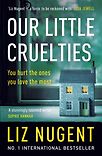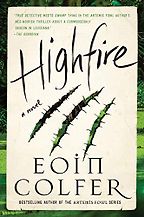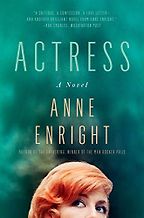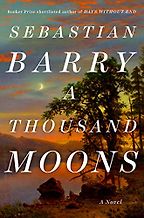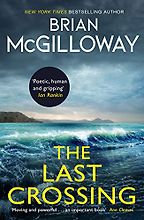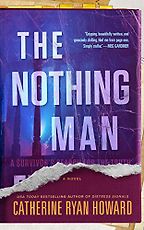We asked you to pick out five of the best recent Irish novels—because contemporary Irish fiction is really having a moment right now. Sally Rooney has been taking over the world thanks to the recent BBC/Hulu adaptation of Normal People, while Naoise Dolan has been dominating bestseller lists too with Exciting Times… and plenty more. Does it feel exciting to be a part of it?
Yes, it’s fantastic. And not just literary fiction, but crime, romance, children’s, and comedy. There is so much more to Irish fiction than Sally Rooney, so, I just wanted to highlight some of the other people out there who, I think, deserve a mention.
Your new novel Our Little Cruelties (Little Cruelties in the US) is the story of a dysfunctional family of three brothers, who are all brilliantly awful to one another. I zipped through it in the space of 24 hours. It has an interesting structure; could you talk us through it?
It starts with a funeral. And the narrator says: All three of the Drumm brothers were at the funeral, but one of us was in the coffin. He implies that he got away with it, so we know that he’s also had a hand in the murder of this brother. But we don’t know, until the very end of the book, which brother is dead and which brother has killed him.
After that opening scene, I take you back to random years in the lives of these brothers, and various incidents that build up a picture of this very dysfunctional family with their impossible, awful mother, who plays favourites with her children in a damaging way.
Get the weekly Five Books newsletter
It’s a big family drama. And it’s funny in parts, but it’s mostly a story of psychological suspense, full of incident and events and things that I remember from my lifetime, like going to a Bob Dylan concert, at the age of 15 or 16, being dragged to the Pope’s mass at the age of 12. I think it’s intriguing for the reader to put it together, to see how their early years influenced the adults they became. They’re all fairly damaged, but it’s not entirely their fault, if you look at how they have been brought up.
Yes, it’s a truly toxic family, who mess each other up over a period of decades.
I start with the oldest brother, then move to the youngest brother and then to the middle brother. Going backwards and forwards in their lives within each section, I build up enough enmity between them so that, by the time we get to the final quarter of the book, they all have enough reasons to kill each other.
It was really fun putting it together. The only thing that changed in the editing process was, I think, that we swapped Brian’s first two chapters. So Brian’s first chapter is now about a childhood fight over food.
So you’ve given us an interesting and very varied list of book recommendations. First up is the first adult novel from bestselling children’s author, Eoin Colfer, Highfire. It’s still a work of fantasy, but it represents a jump in tone and audience.
Let me tell you why I enjoyed it so much. Fantasy is not my thing. Or, I didn’t think it was, but this book has completely changed my mind. I would never have thought of myself as somebody who would like a book about dragons, but this book just made me laugh from beginning to end. It is so funny, so clever.
If you don’t like profanity, skip it. It’s about a dragon who thinks he’s the last of his species. He’s living out his days on the bayou in Louisiana, and has a particular affinity for Absolut vodka and the film Flashdance. He also has very strong opinions about the representation of dragons in Game of Thrones. He’s like this curmudgeonly old man in the body of a dragon, and he relies on this semi-human to bring him his supplies.
“Fantasy is not my thing. But this book has completely changed my mind”
As the last of his species, he is determined to live a quiet life to the end. And then along comes this gormless teenager, who is being targeted by the town’s very corrupt sheriff. There the trouble begins. What follows is an absolutely thrilling rollercoaster ride. It has totally changed my mind about fantasy. It’s very, very funny. There’s a laugh on every page.
This was just an exquisite pleasure, the reading highlight of last year, because it took me out of the pandemic. It took me out of everything. Just delicious. I’m particularly enthusiastic because it was such a surprise.
Delightful! Fantasy is definitely one of those genres that a lot of people have a bias against. But it can be such a joy to take an experimental leap into fresh pastures.
The other thing I would say about this book is that I initially listened to it on audiobook—although I’ve bought a hard copy of it now—and the audio narrator/actor is absolutely superb.
Second, you’ve gone for quite a different book by a Five Books favourite: Anne Enright, who’s returned with a new work of fiction, Actress. It records the rise and fall of an Irish acting legend through the eyes of her daughter.
Yes. The cover [of the British edition] is a picture of Carrie Fisher watching her mother, Debbie Reynolds. I think they chose that cover because it was so apt for the book, in which a middle-aged woman talks about the life of her mother, who was an actress. The characters had a strange relationship. And there’s a lot of what we would definitely call sexual harassment now, but which then was just passed off almost as a rite of passage.
It’s mostly set in the mother’s lifetime—born in 1932, and going up to the present day, when her mother dies. It is just the most beautifully written story about this extraordinary character, who goes mad in the end. It’s told in such a clever way.
“Anne Enright was briefly an actress. She performs this book so brilliantly”
She would have had her day in Hollywood in the mid-1940s, or thereabouts but mostly she was on stage, doing Shakespeare and Ibsen and Chekhov. I worked in the theatre myself—I was a theatre stage manager for 15 years—so I know the acting world really well. And I think that this book, in particular, spoke to me because of that.
I listened to it on audio; Anne Enright narrates the book herself. She was briefly an actress a long time ago. She hasn’t lost any of her ability. She performs this book so brilliantly. It’s so credible. It reads like a true account. I certainly recognise references to characters and real people in the book, who would have been on the Irish theatrical scene throughout those decades.
It’s just a joy of a book. And it’s funny in a dark way. It juxtaposes hilarity with tragedy. I highly recommend it.
This is Enright’s ninth book, I believe. She won the Booker Prize back in 2007 for The Gathering.
People sometimes think that Booker Prize-winning writers are going to be difficult. But there’s nothing difficult about this. It’s a really enjoyable, straightforward read. There is no highfalutin vocabulary. It’s just a really enjoyable, fantastic, lovely book.
The third work of Irish fiction that you have selected is written by another big hitter: Sebastian Barry. This is his latest book, A Thousand Moons, in which we are reunited with some of the characters from Days Without End.
Yes. It’s a follow-up to Days Without End, but I don’t think you need to have read Days Without End to read this—although you should.
It’s set in 1870s Tennessee and is the story of a young Native American girl, Winona, who has been adopted by a couple of gay cowboys, Thomas McNulty and John Cole, who are responsible for slaughtering her entire tribe in the American Indian Wars.
Get the weekly Five Books newsletter
There are two mysteries in it: there’s a crime committed, which is central to the story, but there is also the love that Winona, now an adult, has for these two men who have bought her up as their own, and her loyalty towards them. But there is her dawning realization of who she is, and her status in America at the time, where she is not even considered human; there are no penalties for shooting Indians. Her life is really worthless.
She’s bound together with these two men, who protect her to the best of their ability. And when something awful happens to her the two men waste no time in trying to avenge it. It’s very moving.
Sebastian Barry is one of the most beautiful Irish writers, I think. His prose is really extraordinary. And the way he can put a sentence together, and the way he can inhabit these characters is extraordinary.
Thank you. Our fourth Irish novel is a work of crime fiction by Brian McGilloway, The Last Crossing. This, too, has a very interesting structure, popping back and forth in time.
This is a book about three former IRA operatives, who are under orders to recover bodies that they buried 30 years earlier in Scotland, when they were active paramilitaries. They are Tony, Hugh and Karen. Two of them have moved on with their lives: Tony is now a very respectable, middle-class teacher. He’s put the past behind him. Like many people who got caught up in the Troubles in the 1970s and early ’80s, he was a teenager then, and his politicisation grew out of deprivation and a lack of human rights.
I don’t want to nail my political colours to the mast. But I can tell you that writers from across both sides of the divide in Northern Ireland have saluted this book, because it presents a very human picture of how people can be dragged into a conflict, and how that conflict can follow them throughout their lives. It can show how, when confronted with the awful consequences of their actions 30 years later, all of the emotions that they have buried rise to the surface.
“Writers from across both sides of the divide in Northern Ireland have saluted this book”
There’s also a romantic element to it as well. There’s a will-they-won’t-they between Karen and Tony. And there’s a young boy who’s on the trip with them, who is getting involved in this new wave of paramilitarism. They are trying to protect him, and keep him out of it. The third character, Hugh, is still a staunch Republican who has not moved on.
If you ask Irish people if they want to read about the Troubles, almost everybody will say no. But this book is one that will give you an understanding of both sides. There isn’t a wasted word, there isn’t a word that is ill-used or over-used. He’s a great, great writer, and I really admire him for writing these books while teaching full-time.
It’s a book for anybody who has any doubts or has any questions about what went on, and whether people have moved on or not. This is the book for them.
I wanted to ask you about that. Is there, among Irish or Northern Irish writers, a sense of fatigue around writing about the Troubles? Do people want to move away from that?
It’s funny. I grew up in Dublin, so I was completely unaffected, even though it was all happening just 100 miles up the road. It might as well have been happening in Timbuktu as far as I was concerned. It did not affect anybody in Dublin. I didn’t know anybody from the north of Ireland until I met my husband, who happens to be from Belfast, and then his friends. But even he and his family, because he grew up in a middle-class neighbourhood, were less affected.
The Troubles hit the working classes and the underprivileged hardest on both sides. People were dragged into the conflict out of boredom and unemployment or a struggle for human rights and territory. It gave them a certain status that they wouldn’t otherwise have had.
“There is pressure on Northern Irish writers not to write about The Troubles”
A lot of Northern Irish crime writers don’t write about the North at all. Adrian McKinty wrote a book called The Chain, which became this huge, massive multi-million-selling thing. But prior to that, he had written a string of brilliant detective stories set in Northern Ireland, and I think he’s going to go back to them. But he is somebody who had to write a book set in America in order to become a global success.
Stuart Neville writes brilliantly about Northern Ireland, but he writes about contemporary Northern Ireland, post-Troubles. Again, under the name Haylen Beck, he wrote a couple of novels set in America. So I think there is pressure on Northern Irish writers not to write about the Troubles.
I see. It’s the other way round.
All the time I hear of publishers telling Northern Irish writers not to write about The Troubles because nobody wants to read about it. But, if you’re a writer, how can you not write about your own experience? It’s daft to expect them not to write about something that is their own experience. Eoin McNamee is an example of a writer who does it exceptionally well.
The final work of contemporary Irish fiction you want to recommend is a psychological thriller, The Nothing Man by Catherine Ryan Howard, which is another very cleverly constructed novel.
Yes. It’s probably the most original crime thriller I’ve read this year. It’s a book within a book within a book. The narrator is the only survivor of a family massacre, carried out by a serial killer in the mid 1990s, or thereabouts. And she is now, I think, 30 and writing this book. But the serial killer was never caught. So, while she is writing the book, it flips back between her telling the story she’s writing, and the murderer reading it.
Clever.
It’s extremely clever! You don’t realise until the very end that she has an ulterior motive for writing this book—it is so clever, so tricky, so twisty. Catherine was very much inspired by the real case of the Golden State Killer, Joseph James DeAngelo and the book by Michelle McNamara on him, I’ll Be Gone in the Dark.
It’s set in her native Cork City, which is unusual. Cork is Ireland’s second biggest city and they would claim to be the real capital. It’s kind of like Manchester vs. London, Cork vs. Dublin. There’s a bit of rivalry there. But it’s a wonderful book, thrilling and compelling. It’s being released in the States shortly, where I expect it to be a massive, massive success.
Sounds great. One final thing: I asked at the beginning what it felt like to be part of this new wave of Irish writing. I wondered if you had any feelings about whether it was helpful for us to think of all of these writers, who are—as we have seen—working across many genres and in different styles, as a single movement. Do you think that there’s something that unites you all?
Let me see. I’ve met Catherine, I’ve met Brian. I’ve met Sebastian and I’ve met Anne. I know all these people. The Irish writing scene is very small. We all meet each other on the festival circuit every summer.
Even if they weren’t my friends, I would still highly recommend their books. Brian is probably the one I know the least, I think I’ve only met him once. Catherine, I would have met regularly enough. Anne Enright I’ve met a handful of times, and Eoin Colfer again probably a handful of times. But they’re all tremendously supportive. And Irish writers are tremendously supportive of each other, in general, and it’s a really nice community to be part of.
Everybody is, I hope, pleased for each other’s success. It’s a lovely community feeling. If somebody isn’t doing well, everybody else will get behind them and encourage them, and, you know, if they’ve been disappointed or whatever, we’ll tweet our support or do whatever we can to help each other. Ireland is small and there are a lot of writers. You can’t throw a stone here without hitting one.
Interview by Cal Flyn, Deputy Editor
February 3, 2021. Updated: December 1, 2024
Five Books aims to keep its book recommendations and interviews up to date. If you are the interviewee and would like to update your choice of books (or even just what you say about them) please email us at [email protected]
Five Books interviews are expensive to produce. If you've enjoyed this interview, please support us by donating a small amount.

